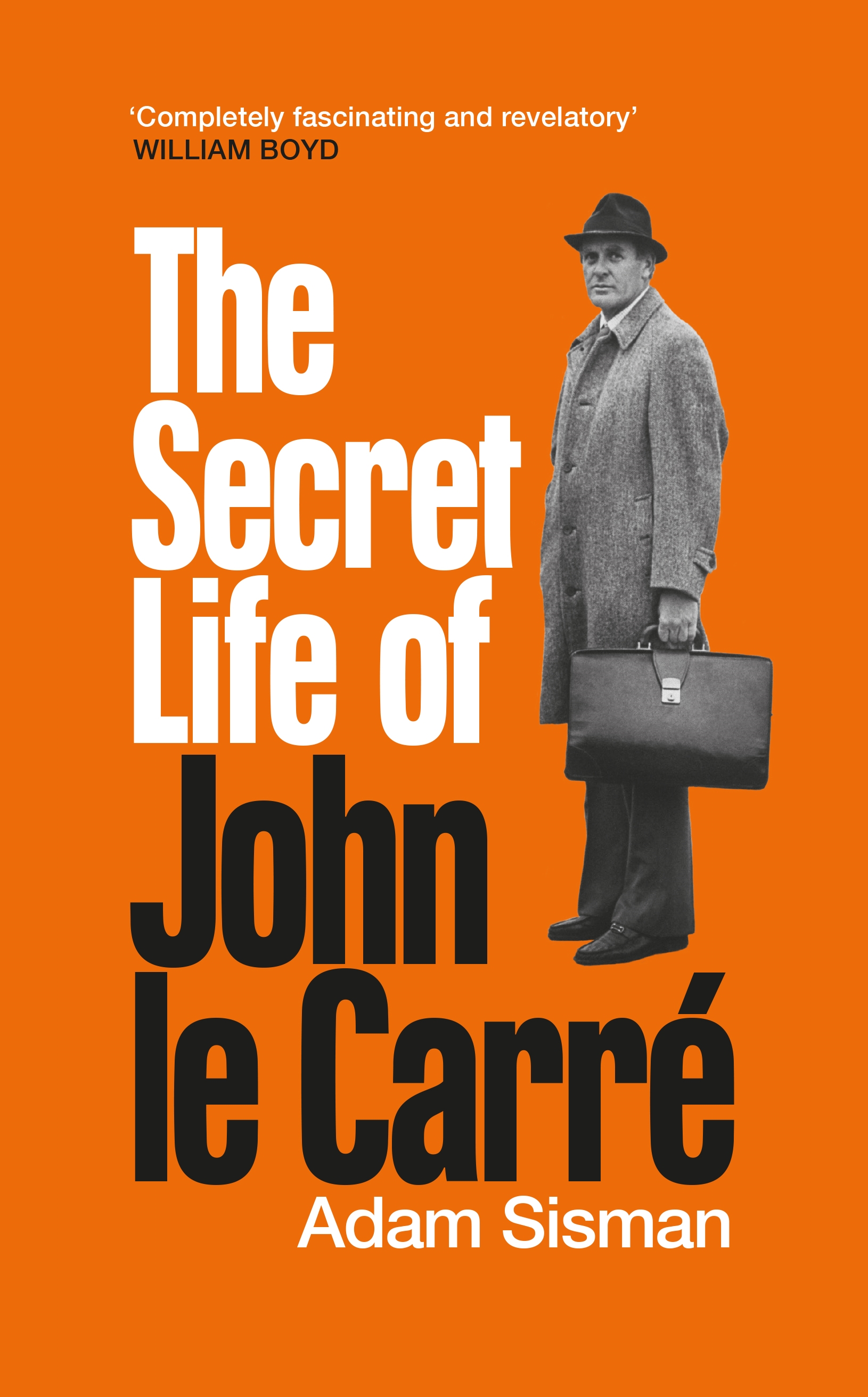Adam Sisman: The Secret Life of John le Carré review - tinker, tailor, soldier, cheat | reviews, news & interviews
Adam Sisman: The Secret Life of John le Carré review - tinker, tailor, soldier, cheat
Adam Sisman: The Secret Life of John le Carré review - tinker, tailor, soldier, cheat
Catalogue of the author’s infidelities doesn’t quite feel justified

This book is quite a sad read. I had been looking forward to it, as a posthumous supplement to Adam Sisman’s 2015 biography of John le Carré/David Cornwell, which, at the time, quite clearly drew a discreet veil over his later private life.
Not that Sisman shies away from this as a potential response to his book. In fact, he faces it head-on from the very first sentence: “Why write the ‘secret life’ of John le Carré? Is it right to make public aspects of his existence that he strove so hard to keep private? In writing this book I was conscious that some might consider the subject matter prurient.” Well, I do. But what saves the book – to an extent – are the outer sections: the first of which tries to justify – and explain his approach to – writing it; and in the second he discusses the difficulties of writing a biography of a living person, in particular the specifics of dealing with Cornwell. In these sections Sisman’s writing is thoughtful, self-aware and nuanced. But in the middle is a big chunk that part of me wishes I hadn’t had to read.
Sisman’s overall thesis is that “in the case of John le Carré […] his pursuit of women was a key to unlocking his fiction”. He suggests that, after his career in British intelligence was brought to an end by the global success of The Spy Who Came In from the Cold, Cornwell “faced a lifetime of sitting alone in his study, scribbling”, and that his “extramarital adventures” – “which required considerable organisation, not to say tradecraft” – provided the “jeopardy and excitement” that generated the books. Indeed, Sisman suggests that, in his seventies and “having lost some of his enthusiasm for the chase”, it is no coincidence that the novels “became less interesting and more formulaic”, although for me that is something of a stretch, as cod-psychology goes. I think he was just getting old.
I was hoping that there may have been some juicy stuff about Cornwell’s time in British intelligence, but no. For all that he always denied his involvement in the secret world, he also dropped knowing asides that hinted at big things he couldn’t talk about. In fact, although his work in MI6 was an open secret, he was in reality a junior functionary and his work quite banal. His later suggestion that Kim Philby blew his cover is ruthlessly squashed: Cornwell was far too junior to have come to Philby’s attention. Likewise, his story about having received the first news of Philby’s defection as a young duty officer in Bonn is either untrue or wildly exaggerated. But which of us haven’t embroidered anecdotes from our younger days? As Cornwell himself said once in an interview: “First you invent yourself, then you get to believe your own invention.” Nonetheless, my main hope for this book was dashed in chapter one.
Then we go into the central section, detailing (some of) his affairs. Some women are named, some not, and there are clearly others who Sisman doesn’t even know about. Several affairs must have been running concurrently. Managing the whole process pre-mobile phones took ingenuity, with cut-outs and dead-letter-drops, but it is all pretty squalid to read about. The grubby “kiss-and-tell” memoir published last year under the pseudonym Suleika Dawson – which I avoided reading at the time – is précised in more detail than necessary, and surprisingly sympathetically. The letters sent to a lover in America are likewise quoted at length (although only his side of the correspondence) and it turns out the recipient tried to sell them back to Cornwell, and subsequently put them on the open market. None of it is at all edifying, and for my money best left between the people involved.
 This includes Cornwell’s second wife Jane, for whom the epithet “long-suffering” might have been invented. She was his “helpmeet”, a constant support in his work, typing up his manuscripts and keeping the world at bay when he was writing, and broadly aware of his philandering. She comes over as an enigmatic figure, someone who didn’t want attention, but as Sisman acknowledges, she stayed with him, despite the humiliation he repeatedly visited on her, and that was her choice.
This includes Cornwell’s second wife Jane, for whom the epithet “long-suffering” might have been invented. She was his “helpmeet”, a constant support in his work, typing up his manuscripts and keeping the world at bay when he was writing, and broadly aware of his philandering. She comes over as an enigmatic figure, someone who didn’t want attention, but as Sisman acknowledges, she stayed with him, despite the humiliation he repeatedly visited on her, and that was her choice.
The final section is interesting, in a low-key way, about the process of writing the first biography, particularly in how Cornwell co-operated with the book by giving interviews but didn’t want it to be an “authorised biography” – until he came to read it, at which point he started meddling. One letter from him contained 196 bullet points, and Sisman’s handling of the whole thing is a lesson in diplomacy. But it is, at best, of niche interest.
Ultimately, the value of this book comes down to how you respond to Sisman’s contention that “one cannot fully understand his work without at least some knowledge of his secret life.” Well, I’m not sure I agree. Betrayal – in both the spying and relationship sense – are central themes of virtually every one of le Carré’s novels, but I reckon they can stand on their own feet, and I would still read and love them even if Cornwell had been the most uxorious of husbands. Sisman concedes that knowing about his behaviour affects our view of Cornwell the man: “it is natural to feel dismay when those whom we admire behave less than well.” And he is ambivalent to the end: “Was he a heartless philanderer or a restless romantic?” Only to slightly cop out: “He seems to have been both.”
“Were sexual adventures a relief from the tedium of the writing life? Was the excitement of adultery, with the risk of exposure, a stimulus to creativity? Was it a substitute for spying?” Ultimately, I don’t really care. Sisman here is, as always, readable, honest, careful, and I really liked the illustration of the book with facsimiles of Cornwell’s letters, but I read with the growing feeling that all this stuff was none of my business.
- The Secret Life of John le Carré by Adam Sisman (Profile Books, £16.99)
- More book reviews on theartsdesk
The future of Arts Journalism
You can stop theartsdesk.com closing!
We urgently need financing to survive. Our fundraising drive has thus far raised £49,000 but we need to reach £100,000 or we will be forced to close. Please contribute here: https://gofund.me/c3f6033d
And if you can forward this information to anyone who might assist, we’d be grateful.

Subscribe to theartsdesk.com
Thank you for continuing to read our work on theartsdesk.com. For unlimited access to every article in its entirety, including our archive of more than 15,000 pieces, we're asking for £5 per month or £40 per year. We feel it's a very good deal, and hope you do too.
To take a subscription now simply click here.
And if you're looking for that extra gift for a friend or family member, why not treat them to a theartsdesk.com gift subscription?
more Books
 'We are bowled over!' Thank you for your messages of love and support
Much-appreciated words of commendation from readers and the cultural community
'We are bowled over!' Thank you for your messages of love and support
Much-appreciated words of commendation from readers and the cultural community
 Robin Holloway: Music's Odyssey review - lessons in composition
Broad and idiosyncratic survey of classical music is insightful but slightly indigestible
Robin Holloway: Music's Odyssey review - lessons in composition
Broad and idiosyncratic survey of classical music is insightful but slightly indigestible
 Thomas Pynchon - Shadow Ticket review - pulp diction
Thomas Pynchon's latest (and possibly last) book is fun - for a while
Thomas Pynchon - Shadow Ticket review - pulp diction
Thomas Pynchon's latest (and possibly last) book is fun - for a while
 Justin Lewis: Into the Groove review - fun and fact-filled trip through Eighties pop
Month by month journey through a decade gives insights into ordinary people’s lives
Justin Lewis: Into the Groove review - fun and fact-filled trip through Eighties pop
Month by month journey through a decade gives insights into ordinary people’s lives
 Joanna Pocock: Greyhound review - on the road again
A writer retraces her steps to furrow a deeper path through modern America
Joanna Pocock: Greyhound review - on the road again
A writer retraces her steps to furrow a deeper path through modern America
 Mark Hussey: Mrs Dalloway - Biography of a Novel review - echoes across crises
On the centenary of the work's publication an insightful book shows its prescience
Mark Hussey: Mrs Dalloway - Biography of a Novel review - echoes across crises
On the centenary of the work's publication an insightful book shows its prescience
 Frances Wilson: Electric Spark - The Enigma of Muriel Spark review - the matter of fact
Frances Wilson employs her full artistic power to keep pace with Spark’s fantastic and fugitive life
Frances Wilson: Electric Spark - The Enigma of Muriel Spark review - the matter of fact
Frances Wilson employs her full artistic power to keep pace with Spark’s fantastic and fugitive life
 Elizabeth Alker: Everything We Do is Music review - Prokofiev goes pop
A compelling journey into a surprising musical kinship
Elizabeth Alker: Everything We Do is Music review - Prokofiev goes pop
A compelling journey into a surprising musical kinship
 Natalia Ginzburg: The City and the House review - a dying art
Dick Davis renders this analogue love-letter in polyphonic English
Natalia Ginzburg: The City and the House review - a dying art
Dick Davis renders this analogue love-letter in polyphonic English
 Tom Raworth: Cancer review - truthfulness
A 'lost' book reconfirms Raworth’s legacy as one of the great lyric poets
Tom Raworth: Cancer review - truthfulness
A 'lost' book reconfirms Raworth’s legacy as one of the great lyric poets
 Ian Leslie: John and Paul - A Love Story in Songs review - help!
Ian Leslie loses himself in amateur psychology, and fatally misreads The Beatles
Ian Leslie: John and Paul - A Love Story in Songs review - help!
Ian Leslie loses himself in amateur psychology, and fatally misreads The Beatles
 Samuel Arbesman: The Magic of Code review - the spark ages
A wide-eyed take on our digital world can’t quite dispel the dangers
Samuel Arbesman: The Magic of Code review - the spark ages
A wide-eyed take on our digital world can’t quite dispel the dangers

Add comment